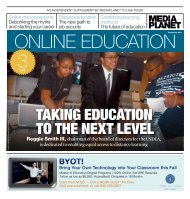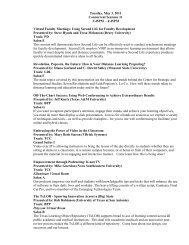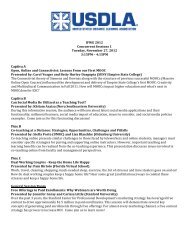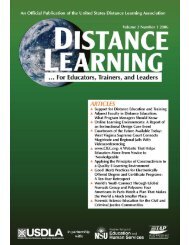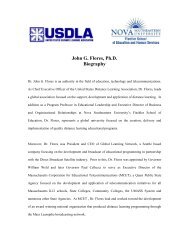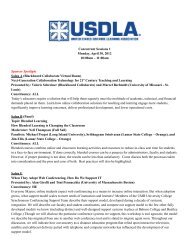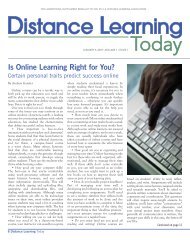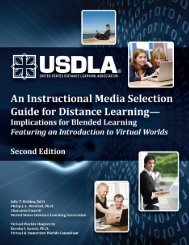United States Distance Learning Association
United States Distance Learning Association
United States Distance Learning Association
- No tags were found...
Create successful ePaper yourself
Turn your PDF publications into a flip-book with our unique Google optimized e-Paper software.
attended a residential version of the<br />
course) these Marines simply did not stack<br />
up. Comprehending what they were supposed<br />
to be learning and then effectively<br />
employing that learning on the job was<br />
consistently observed as less than<br />
expected. Even when the box of books was<br />
augmented with seminars, there remained<br />
a distinct difference between the two<br />
groups. But, the supplementary seminar<br />
presentations were voluntary and the format<br />
was more or less a lecture at a distance<br />
that may or may not have been relevant to<br />
the individual student; they were still, by<br />
their very nature, not equal to the residential<br />
program.<br />
Enter the U. S. Marine Corps’ Son of<br />
Seminar. It hit the ground running in<br />
October 2007. Based on the Socratic<br />
method, this new delivery format will be<br />
centered on highly seasoned instructors<br />
positing well-directed questions and limiting<br />
their lecture time in deference to the<br />
facilitation of student-to-student discussion.<br />
The program will consist of eight<br />
courses to be delivered over a reduced 2-<br />
year construct. Active student participation<br />
is a requirement in the seminars that<br />
will be offered both on-site and online.<br />
Rubrics will be used to assess student contributions,<br />
writing, speaking and performance<br />
in exercises.<br />
One of the people heading up this<br />
transformation in Marine Corps distance<br />
education is James I. Van Zummeren, dean<br />
of academics, Marine Corps College of<br />
Continuing Education, Training and Education<br />
Command (TECOM). In a recent<br />
interview, he gave his views on the direction<br />
of distance e in the Marine Corps.<br />
PERSONAL EXPERIENCE WITH<br />
DISTANCE EDUCATION IN THE<br />
MARINE CORPS<br />
PROMMASIT: What experience did you<br />
have with distance education as a Marine<br />
officer<br />
VAN ZUMMEREN: I did two nonresident<br />
courses. I did the Amphibious Warfare<br />
School for captains. I did the<br />
traditional box of books, nonresident; we<br />
call it Independent Guided Studies, IGS. I<br />
did that as a lieutenant, and then as a captain<br />
went to the resident school. I also did<br />
the Naval War College, what they call the<br />
off-campus program. It’s a nonresident,<br />
seminar-based 3-year construct. I did that,<br />
but then I also went to the Marine Corps<br />
Command Staff resident experience. So I<br />
did two nonres and two resident of similar<br />
courses.<br />
ORNDORFF: Can you expound a little<br />
bit on what your view of the difference is<br />
between education and training, and how<br />
that relates to what you’re doing with the<br />
Marine Corps distance education program<br />
VAN ZUMMEREN: You know it’s<br />
always fun, because when we get into conferences<br />
or meetings, at a training and<br />
education command or anywhere really in<br />
the world of academics, there’s always a<br />
conversation on whether that’s really<br />
training or that’s really education. Some of<br />
us have a perspective that there isn’t all<br />
education and/or all training. It’s really a<br />
combination. In some there is going to be a<br />
little bit more emphasis on critical thinking<br />
and creative thinking, and some is going to<br />
be a little bit more emphasis on a process of<br />
doing something within an approved set<br />
of procedures.<br />
So the training and education to me is<br />
somewhat blurred. For example, our Command<br />
Staff College <strong>Distance</strong> Program is<br />
more about education because it deals<br />
more about thinking about things, learning<br />
about strategic thought, and coming<br />
up with solutions that not only are critical<br />
based on doctrine and constructs, but also<br />
creative. That’s the whole point—bring in<br />
your own perspective to solve or provide a<br />
solution to some kind of emerging issue.<br />
The training aspect is more like our Expeditionary<br />
Warfare School, School of Captains,<br />
in which we are looking for them to<br />
88 <strong>Distance</strong> <strong>Learning</strong> Volume 4, Issue 4



